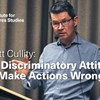runt

Garrett Cullity: How Discriminatory Attitudes Can Make Actions Wrong
Research seminar with Garrett Cullity, professor of philosophy at the Australian National University, known for his research on moral philosophy. Abstract In general, otherwise permissible actions do

Garrett Cullity: How Discriminatory Attitudes Can Make Actions Wrong
Research seminar with Garrett Cullity, professor of philosophy at the Australian National University, known for his research on moral philosophy. Abstract In general, otherwise permissible actions do
Workshop on Social Normativity
Venue: Institute for Futures Studies, Holländargatan 13, Stockholm Organizers: Eline Geritsen, Johan Brännmark, and Åsa Burman.If you wish to join parts of this workshop, get in touch with Åsa Burman, a
Garrett Cullity: But Thinking Makes It So: How Discriminatory Attitudes Can Make Actions Wrong
Research seminar with Garrett Cullity, professor of philosophy at the Australian National University, known for his research on moral philosophy. Venue: Holländargatan 13, Stockholm Register here > Ab
Completed: Preferences for coordination - their function and evolutionary foundation
Using behavioral game theory, this project aims to provide a deeper understanding of how collective action decisions are made and why people make the choices they do.
Justicia Intergeneracional
In Íñigo González, Jahel Queralt, Razones públicas: Una introducción a la filosofía política, Ariel, 2021 About the Chapter “Intergenerational Justice” Future generations are a crucial concern of our time gi

Johan Westerman
Johan Westerman is a researcher who obtained his PhD in sociology from the Swedish Institute for Social Research (SOFI) in 2020. His dissertation, entitled Motives Matter, investigated the intrinsic mo
Artificial Intelligence and the Political Legitimacy of Global Governance
Political Studies, vol. 72 Abstract Although the concept of “AI governance” is frequently used in the debate, it is still rather undertheorized. Often it seems to refer to the mechanisms and structures
Eva Erman: Artificial Intelligence and the Political Legitimacy of Global Governance
Research seminar with Eva Erman. AbstractThe study of the social and ethical impact of AI is still in its infancy and contributions to the field have to keep up with the continuous developments of the important procedural aspects of good AI governance. One of the most important properties of good governance is political legitimacy. Starting out from the assumption that AI governance should be seen as global in scope, this paper has a twofold aim: a) to develop a theoretical framework for theorizing the political legitimacy of global AI governance and b) to demonstrate how it can be used as a critical yardstick for assessing the (lack of) legitimacy of actual instances of AI governance.
Democracy and values in science
Political philosophy meets philosophy of science Philosophers of science have long discussed whether the core activities of science can be free from non-epistemic values (this term is used broadly to i








